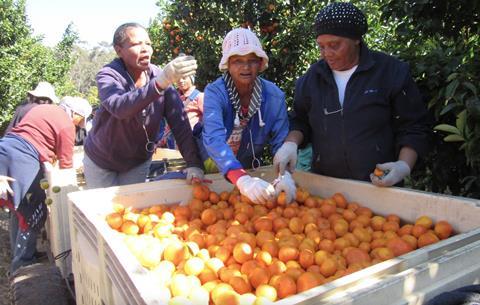Managing growth is just one of several major challenges for the country’s citrus industry as the 2024 season gears up
While there will be growth in South African citrus exports this year, the industry faces some formidable challenges.

These were highlighted by Citrus Growers’ Association (CGA) chief executive Justin Chadwick as the industry announced its first forecast for the new season.
High on the list is the ongoing stand-off between the South Africans and the European Union over phytosanitary regulations regarding citrus black spot (CBS) and false codling moth (FCM), as well as inefficient logistics across the country’s port and rail networks.
“The European Union’s discriminatory and unscientific phytosanitary regulations regarding citrus black spot (CBS) and false codling moth (FCM) is a serious threat as it could lead to South Africa being denied access to the European market,” said Chadwick.
The EU accounts for more than one-third of South African citrus exports and the ongoing saga is causing much concern among growers in the industry.
During the 2023 export season Southern African citrus growers packed 165.1m cartons for delivery to global markets.
While this was an increase of approximately 800,000 cartons on the packed figures of the previous year, it was substantially below the long-term anticipated growth curve.
“The industry can potentially reach the target of 200m cartons in the next four years, and possibly 260m cartons by 2032,” Chadwick noted.
In terms of the EU dispute, the CGA said that given the high stakes involved, it hoped the South African government would soon call for the establishment of an independent World Trade Organisation (WTO) panel to adjudicate on the FCM matter.
“On CBS it is essential that the government calls for a WTO consultation process,” Chadwick confirmed.
If the CGA is hoping that this process will move forward quickly in the months ahead, it may be disappointed. It is election season in South Africa and for the first time in 30 years the governing ANC party is under threat of losing its overall majority.
It is a fierce battle, and it is unlikely that those chasing votes will see the EU issue as a priority which must be addressed before the peak citrus season this year.
“Inefficient logistics also remains a major concern,” Chadwick continued. “Congestion at the ports has been holding back growth in the citrus sector and the South African economy at large.
”Transnet, in collaboration with industry stakeholders, has been addressing port efficiency in the past months and will continue unabated to do so. But the fear still remains that equipment breakdowns and related disruptions might influence exports this season.”
The CGA said that it viewed the expeditious introduction of the appointed private operator of Durban’s Pier 2 container terminal, International Container Terminal Services as critical.
“Any delays in the expansion of private sector involvement in port logistics will in effect imperil the export economy,” Chadwick noted.
There is, however, also reason for optimism for the season.
“The CGA remains cautiously hopeful about the coming season,” he said. ”Recent successes for the industry ahead of exports kicking off include the entry of global liner shipping company, Hapag-Lloyd, into the SA shipping market, as well as the expansion of the shipping options offered by global company MSC.”
A new bilateral protocol between South Africa and Vietnam has also been established, opening the Vietnamese market to South African oranges.
South Africa says Vietnam has the potential to receive around 15,000 tonnes of South African citrus.



